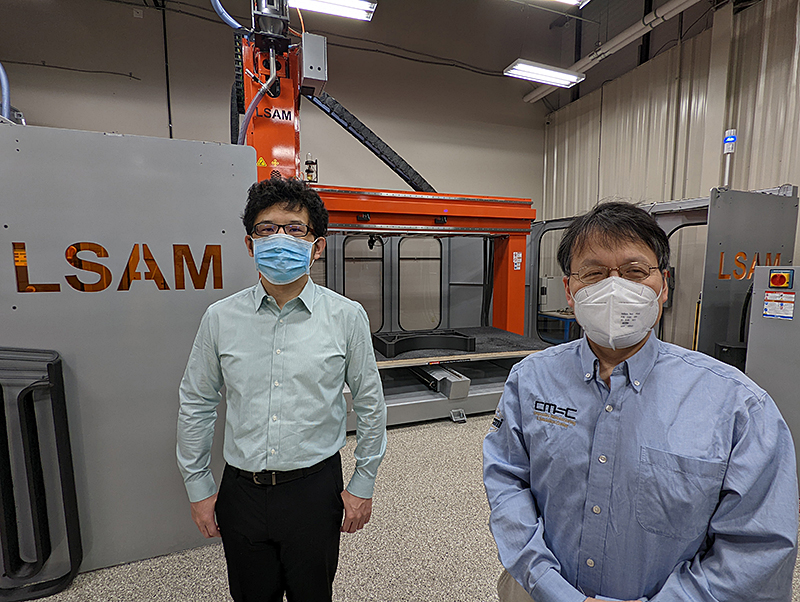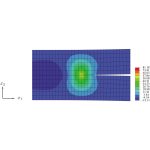AnalySwift Receives NASA Contract to Partner with Purdue, UT-Arlington to Improve Simulation of Tailorable Composites Used in Spacecraft, NASA Missions

Liang Zhang of AnalySwift (left) and Wenbin Yu of Purdue’s College of Engineering stand in front of models of lightweight structures made from tailorable composites. Yu is principal investigator and Zhang one of two co-investigators on a research project funded by a Phase I STTR contract from the National Aeronautics and Space Administration. (Photo provided by Wenbin Yu)
WEST LAFAYETTE, Ind. – Achieving affordable space exploration will require lightweight structures for vehicles, solar arrays and antennas. Lightweight materials also will be used for components of structures like pressurized habitats, cryogenic tanks, landing gears and truss cages.
The problem is that NASA envisions that many of those structures will be made from tailorable composite materials, but no design tool has been able to fully exploit the materials’ full potential. AnalySwift LLC, a Purdue University-affiliated commercial software provider, and Wenbin Yu, a professor in Purdue’s School of Aeronautics and Astronautics, are conducting research to create one. Yu is the principal investigator. Liang Zhang of AnalySwift and Xin Liu of the University of Texas at Arlington are co-investigators.
Allan Wood, AnalySwift president and CEO, said that existing design tools were developed for traditional composites, which have straight fibers. If an open area is needed inside a traditional composite structure, this is often accomplished by creating a cut-out after it is manufactured, which can compromise the integrity of the structure.
“Tailorable composites, also known as tow-steered or variable thickness composites, however, can be highly customized thanks to improvements in manufacturing,” he said. “New robotic techniques can weave fibers around areas intended for openings, expanding design options while improving the structures’ overall properties.”
AnalySwift has received a one-year, $125,000 Phase I STTR contract from the National Aeronautics and Space Administration for a project titled “An Efficient, High-Fidelity Design Tool for Advanced Tailorable Composites.”
Yu said the project will benefit NASA and related agencies and industries by exploiting the potential of tailorable composites for designing better lightweight structures.
“The resulting efficient, high-fidelity design tool developed in this project will shorten the design and analysis period of structures made of tailorable composites,” Yu said.
Wood said the design tool will have applications on Earth as well as in space, including aerospace, energy and wind, automotive, marine and other industries.
“The tool could also lead to improve designs for high-performance, tailorable structures like prosthetics, electronics and sporting goods with reduced design cost and time,” he said.
The full article is available on Purdue’s website here. A pdf of the full press release can be viewed here.
About AnalySwift
AnalySwift LLC is a provider of composite simulation software, which enables an unprecedented combination of efficiency and accuracy, including multiphysics structural and micromechanics modeling. Drawing on cutting-edge university technology, AnalySwift’s powerful solutions save orders of magnitude in computing time without a loss of accuracy so users can consider more design options and arrive at the best solution more quickly. The technologies deliver the accuracy of detailed 3D FEA at the efficiency of simple engineering models, cutting analysis time by orders of magnitude. SwiftComp is licensed from Purdue Research Foundation. VABS is licensed from Utah State University, Purdue University, and Georgia Institute of Technology. Contact AnalySwift at info@analyswift.com.
About Purdue University
Purdue University is a top public research institution developing practical solutions to today’s toughest challenges. Ranked in each of the last four years as one of the 10 Most Innovative universities in the United States by U.S. News & World Report, Purdue delivers world-changing research and out-of-this-world discovery. Committed to hands-on and online, real-world learning, Purdue offers a transformative education to all. Committed to affordability and accessibility, Purdue has frozen tuition and most fees at 2012-13 levels, enabling more students than ever to graduate debt-free. See how Purdue never stops in the persistent pursuit of the next giant leap at https://purdue.edu/.
Writer: Steve Martin, sgmartin@prf.org
Sources: Allan Wood, allanwood@analyswift.com
Wenbin Yu, wenbinyu@purdue.edu











